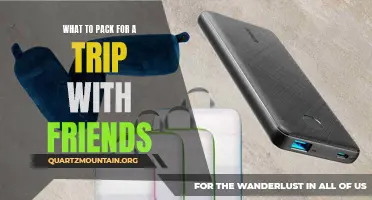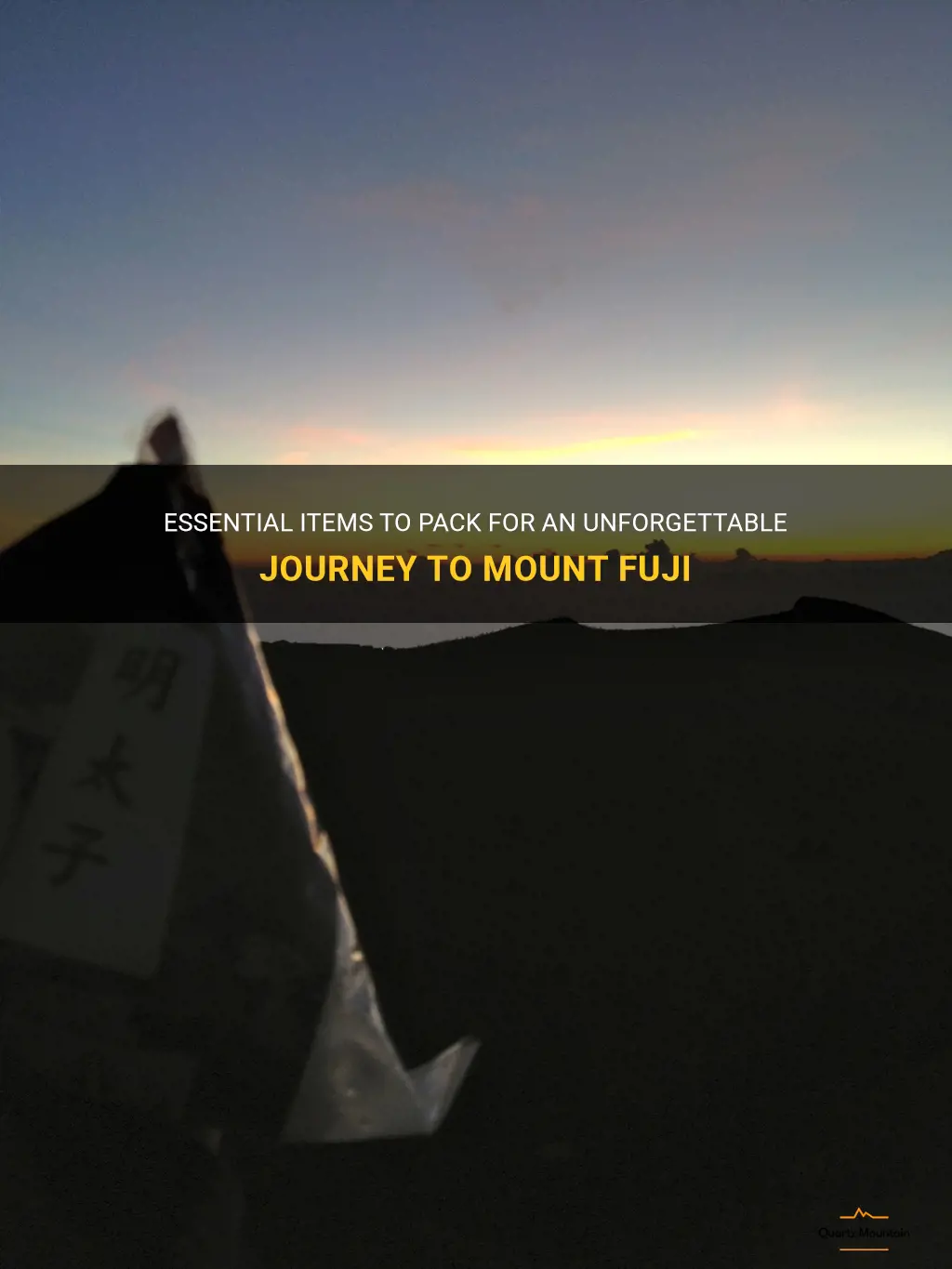
Mount Fuji, with its majestic beauty and captivating presence, is a destination that has been enticing travelers for centuries. Rising above the clouds, this iconic peak offers a glimpse into the mystical world of Japan's rich history and natural wonders. However, venturing to the summit of Mount Fuji requires careful planning and preparation to ensure a safe and unforgettable journey. One crucial element of this preparation is packing the essential items necessary to tackle the challenges of the ascent. From sturdy hiking boots to warm layers and nourishing snacks, these key items are the backbone of any successful expedition to Mount Fuji. So, grab your backpack and let's dive into the essential items you need to make your journey to Mount Fuji an absolute dream come true.
What You'll Learn
- What are the essential items to pack for a Mount Fuji hike?
- Are there any specific clothing items recommended for hiking Mount Fuji?
- What types of food and snacks should be packed for a Mount Fuji hike?
- Are there any necessary camping gear or equipment needed for an overnight Mount Fuji hike?
- Are there any safety items or emergency gear that should be included in a Mount Fuji packing list?

What are the essential items to pack for a Mount Fuji hike?
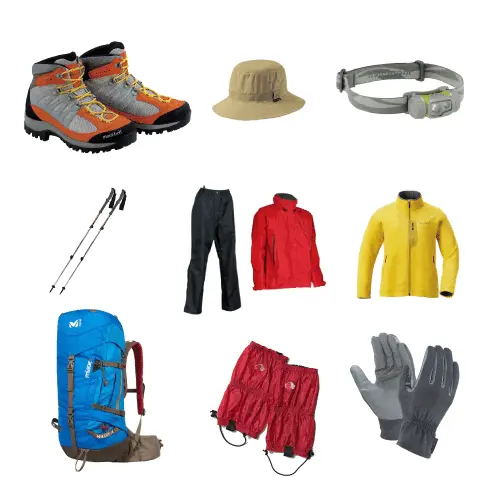
If you are planning a hike up Mount Fuji, it is essential to pack the right items to ensure a safe and enjoyable experience. Mount Fuji, located in Japan, is an iconic and active volcano that attracts hikers from around the world. The hike can be challenging due to the high altitude and unpredictable weather conditions, so it is important to be well-prepared. In this article, we will discuss the essential items that you should pack for a Mount Fuji hike.
- Proper footwear: A sturdy pair of hiking boots is crucial for a Mount Fuji hike. The terrain can be uneven and slippery, so it is important to have footwear that provides good traction and ankle support. Make sure your boots are broken in before the hike to prevent blisters.
- Layered clothing: The weather on Mount Fuji can change rapidly, so it is important to wear layered clothing. Start with a moisture-wicking base layer, followed by a insulating layer, and finally a waterproof and windproof outer layer. This will allow you to adjust your clothing as the temperature changes throughout the hike.
- Headlamp: Mount Fuji is best hiked during the night to catch the breathtaking sunrise from the summit. A headlamp is essential for navigating in the dark and ensuring your safety. Make sure to bring extra batteries as well.
- Trekking poles: Trekking poles can provide stability and reduce the strain on your knees during the descent. They are especially useful on the loose and rocky terrain found on Mount Fuji. Opt for lightweight and collapsible poles that can easily be packed when not in use.
- Food and water: Bring plenty of high-energy snacks and water for the hike. There are limited food and water options on the trail, so it is important to have enough to sustain your energy levels. Pack lightweight and non-perishable items such as energy bars, nuts, and dried fruits.
- First aid kit: It is always important to have a first aid kit on any hike, and Mount Fuji is no exception. Stock your kit with bandages, antiseptic wipes, pain relievers, and any necessary prescription medications. Be prepared for common hiking ailments such as blisters, cuts, and dehydration.
- Sun protection: The sun can be intense at higher altitudes, so sun protection is crucial. Pack sunscreen, sunglasses, and a wide-brimmed hat to protect your skin and eyes from the harmful rays. Don't forget lip balm with SPF as well.
- Navigation tools: While the Mount Fuji trail is well-marked, it is still a good idea to carry a map, compass, and GPS device. These tools can come in handy if you need to navigate in low visibility or in case of an emergency.
- Backpack: A comfortable and durable backpack is essential for carrying all your gear. Look for one with padded straps and a waist belt for added support. Make sure your pack is large enough to fit all your essentials, but not too heavy to carry for a long distance.
- Respect for the environment: Lastly, don't forget to pack your respect for the environment. Mount Fuji is a sacred place for the Japanese people, so it is important to adhere to any rules or regulations set by the authorities. Leave no trace behind and always practice responsible hiking.
In conclusion, packing the right items is crucial for a successful Mount Fuji hike. Be sure to pack proper footwear, layered clothing, a headlamp, trekking poles, food and water, a first aid kit, sun protection, navigation tools, a backpack, and respect for the environment. With these essentials, you will be well-prepared for the challenges that await on the majestic Mount Fuji.
What to Pack for Your June Trip to Washington DC
You may want to see also

Are there any specific clothing items recommended for hiking Mount Fuji?
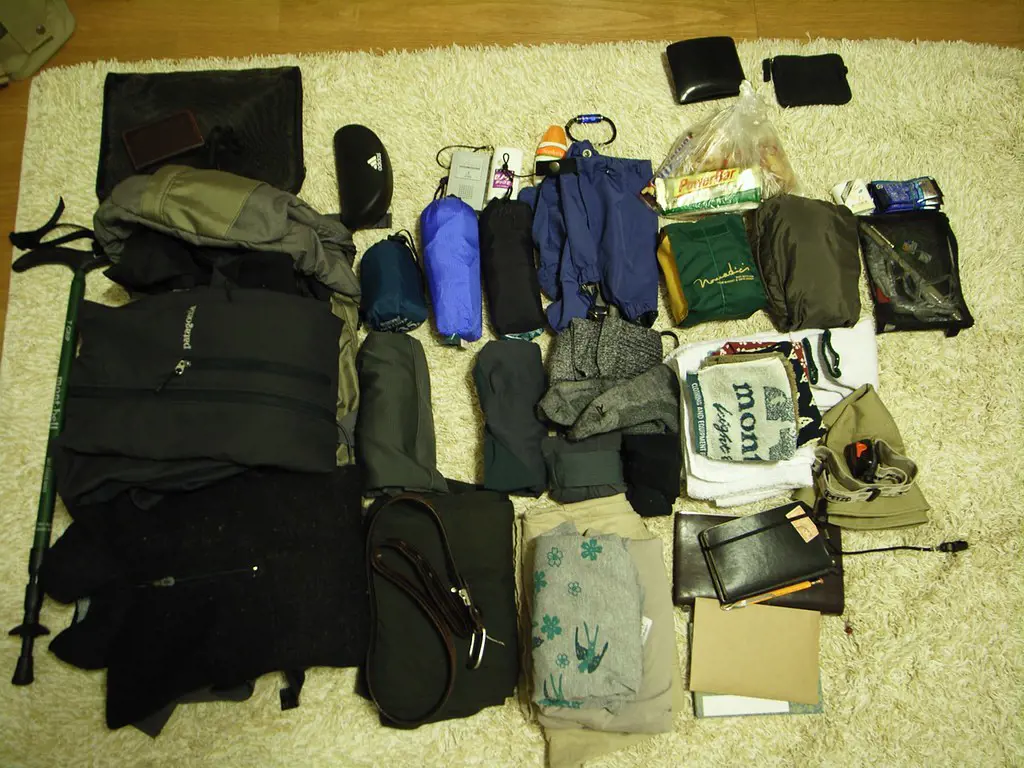
Hiking Mount Fuji is a challenging and exhilarating experience that requires careful planning and preparation. One essential aspect of your preparation is selecting the right clothing for the hike. The weather on Mount Fuji can change rapidly, so it is important to wear clothing that will keep you comfortable and protected throughout your climb. In this article, we will discuss some specific clothing items that are recommended for hiking Mount Fuji.
- Layered Clothing: The weather on Mount Fuji can vary greatly between the base and the summit. It is important to wear layered clothing so that you can adjust your outfit as needed. Start with a moisture-wicking base layer to keep you dry and comfortable. Add a lightweight, insulating layer such as a fleece or down jacket to stay warm in colder conditions. Finally, bring a waterproof and windproof outer layer to protect you from the elements.
- Quick-Drying and Breathable Fabrics: When hiking Mount Fuji, you are likely to sweat and encounter various weather conditions. Therefore, it is crucial to choose clothing made from quick-drying and breathable fabrics. Avoid cotton, as it retains moisture and can leave you feeling cold and uncomfortable. Opt for synthetic materials or merino wool, which wick away sweat and keep you dry and warm.
- Hiking Pants: It is recommended to wear quick-drying and lightweight hiking pants that provide freedom of movement. Avoid jeans or heavy trousers that can restrict your agility and become uncomfortable when wet. Look for pants with zip-off legs, as they can be converted into shorts if the weather becomes warmer.
- Moisture-Wicking Underwear and Socks: Choosing the right underwear and socks is essential for a comfortable hike. Opt for moisture-wicking underwear that will keep you dry and prevent chafing. Similarly, choose moisture-wicking and cushioned socks that are specifically designed for hiking to prevent blisters and keep your feet comfortable throughout the climb.
- Hiking Boots: Investing in a good pair of hiking boots is crucial for a successful climb. Look for boots that provide ankle support, good traction, and are waterproof. Make sure to break them in before the hike to avoid blisters and discomfort.
- Hat and Sunglasses: The sun can be intense on Mount Fuji, so it is important to protect yourself from harmful UV rays. Wear a hat with a brim to shade your face and neck from the sun. Additionally, wear sunglasses to protect your eyes from glare and harmful UV radiation.
- Gloves: As you approach the summit, temperatures can drop significantly, and strong winds can make it feel even colder. It is important to wear gloves to protect your hands from the cold and wind. Look for gloves that are lightweight, waterproof, and have good insulation.
These are some of the specific clothing items that are recommended for hiking Mount Fuji. Remember to check the weather forecast before your hike and make any necessary adjustments to your clothing choices. Proper clothing can significantly enhance your comfort and safety during your climb. With the right gear, you will be well-prepared to tackle the challenges of hiking Mount Fuji and enjoy the breathtaking views along the way.
Essential Gear: What to Pack for Gravel Touring Adventures
You may want to see also

What types of food and snacks should be packed for a Mount Fuji hike?
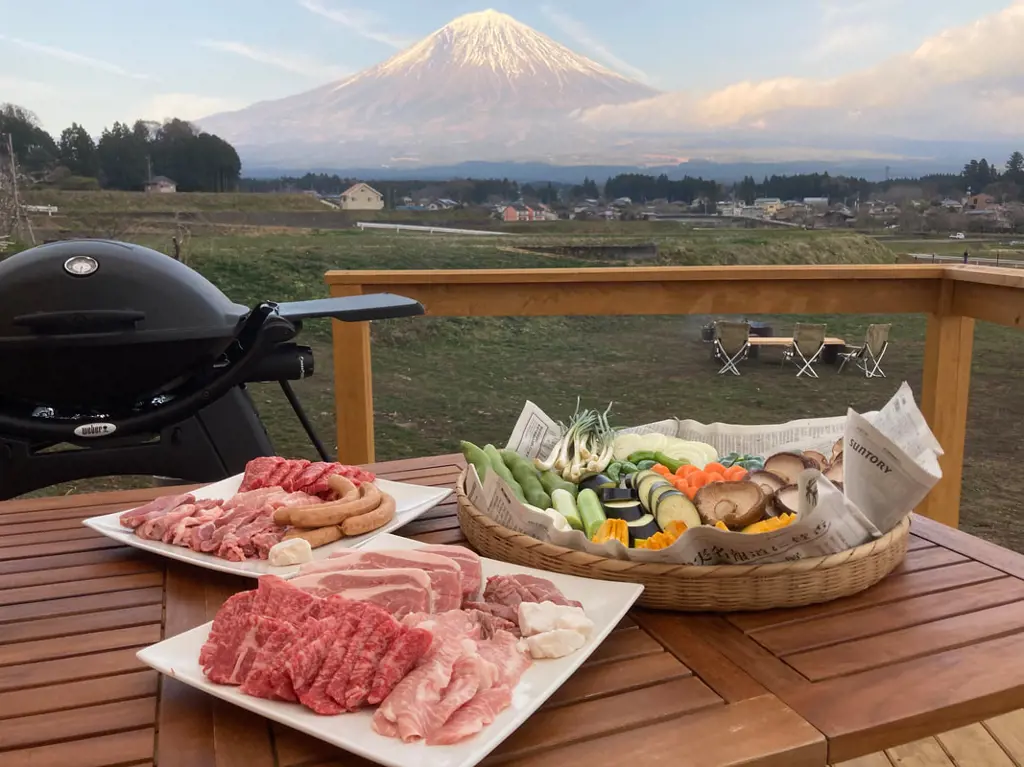
When planning a hike up Mount Fuji, it is essential to pack the right types of food and snacks to keep you energized and nourished throughout your climb. Whether you are a seasoned hiker or a first-timer, having nutritious and easily digestible food options is crucial for a successful and enjoyable hike. In this article, we will discuss the types of food and snacks that you should consider packing for your Mount Fuji adventure.
Portable and lightweight options:
When hiking, it is important to choose food that is easy to carry and doesn't weigh you down. Opt for lightweight options such as energy bars, trail mix, and dehydrated meals. These types of foods pack a lot of calories and essential nutrients into a small package, making them perfect for long hikes.
High-energy snacks:
To sustain your energy levels throughout the hike, pack snacks that are high in carbohydrates and healthy fats. These can provide a quick boost of energy and help prevent fatigue. Examples of high-energy snacks include bananas, dried fruits, nuts, and nut butter packets.
Electrolyte-rich beverages:
Staying hydrated is crucial during any physical activity, especially during a demanding hike like Mount Fuji. In addition to drinking plenty of water, consider packing some electrolyte-rich beverages to replenish the minerals lost through sweating. Electrolyte drinks or powders can help prevent dehydration and maintain your electrolyte balance.
Pre-made sandwiches or wraps:
If you prefer more substantial meals during your hike, pre-made sandwiches or wraps can be a great option. Choose whole-grain bread or wraps and fill them with lean protein such as turkey or chicken, along with vegetables and spreads like hummus or avocado. These meals provide a good balance of carbohydrates, protein, and fiber to keep you satiated.
Quick and easy-to-eat fruits:
Fresh fruits are an excellent source of vitamins, minerals, and natural sugars to keep you refreshed and hydrated during your hike. Pack easy-to-eat fruits like grapes, berries, or sliced oranges that don't require much preparation and won't get squashed in your backpack.
Re-sealable bags for garbage:
It is important to leave no trace when hiking, so make sure to bring re-sealable bags to store any garbage or food waste. Mount Fuji is a pristine natural environment, and it is our responsibility as hikers to keep it clean and free from litter.
Remember, the key is to pack food that is nutritious, easily transportable, and won't spoil quickly. It is also a good idea to bring a combination of sweet and savory snacks to satisfy different cravings throughout the hike. Additionally, consider your personal preferences and dietary restrictions when choosing the types of food and snacks to pack. This will ensure that you have a comfortable and enjoyable hiking experience on Mount Fuji.
Essential Items to Pack in Your Duck Hunting Blind Bag
You may want to see also

Are there any necessary camping gear or equipment needed for an overnight Mount Fuji hike?
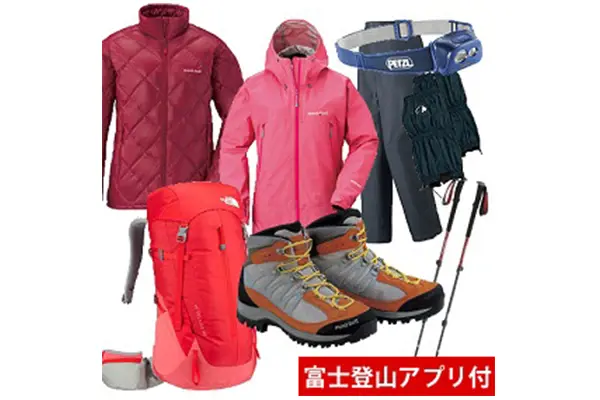
If you are planning on embarking on an overnight hike up Mount Fuji, there are certain camping gear and equipment that are absolutely necessary for a safe and enjoyable experience. Mount Fuji is not only one of Japan's most iconic mountains, but it is also one of the most popular hiking destinations in the world. With an elevation of 3,776 meters (12,389 feet), Mount Fuji poses a unique set of challenges and risks that must be taken into consideration when packing for your hike.
First and foremost, a sturdy and reliable backpack is essential for carrying all your camping gear and equipment. Look for a backpack that is specifically designed for long hikes, with ample storage space and comfortable straps. It is important to choose a backpack that fits you well and distributes the weight evenly on your back, as you will be carrying it for long periods of time.
Next, a high-quality tent is a must-have for an overnight Mount Fuji hike. Since the weather conditions on the mountain can change rapidly, it is important to invest in a tent that is both waterproof and windproof. Look for a tent that is lightweight and easy to set up, as you will likely be setting up camp in different locations along the trail. A tent with a vestibule or porch area will also come in handy for storing your hiking boots and wet gear.
Sleeping gear is another essential component of camping equipment for a Mount Fuji hike. A warm and comfortable sleeping bag is crucial, as temperatures on the mountain can drop below freezing even in the summer months. Look for a sleeping bag that is rated for the temperatures you expect to encounter on the mountain. Additionally, a sleeping pad or mattress is important for insulation and added comfort during your night's rest.
Proper clothing is also key when it comes to camping gear for a Mount Fuji hike. Dressing in layers is the best way to regulate your body temperature as you ascend and descend the mountain. It is recommended to have a lightweight and breathable base layer, a warm insulating layer, and a waterproof outer layer. Be sure to also pack a hat, gloves, and extra socks, as the weather can change rapidly.
In addition to these essentials, there are a few other camping gear and equipment items that are recommended for a Mount Fuji hike. A reliable headlamp or flashlight is essential for navigating in the dark, as you may be starting your climb in the early hours of the morning. A portable stove and cooking equipment are also recommended, as it is important to stay hydrated and nourished throughout your hike. Finally, a first aid kit, sunscreen, insect repellent, and a map or compass are all important items to have in case of emergencies or unexpected situations.
In conclusion, there are several necessary camping gear and equipment items that are essential for an overnight Mount Fuji hike. A sturdy backpack, a high-quality tent, sleeping gear, proper clothing, a headlamp or flashlight, a portable stove and cooking equipment, a first aid kit, sunscreen, insect repellent, and a map or compass are all important items to bring along. By being properly equipped, you will be better prepared to tackle the challenges and enjoy the beauty of Mount Fuji during your overnight hike.
Essential Items to Pack for a December Trip to Japan
You may want to see also

Are there any safety items or emergency gear that should be included in a Mount Fuji packing list?
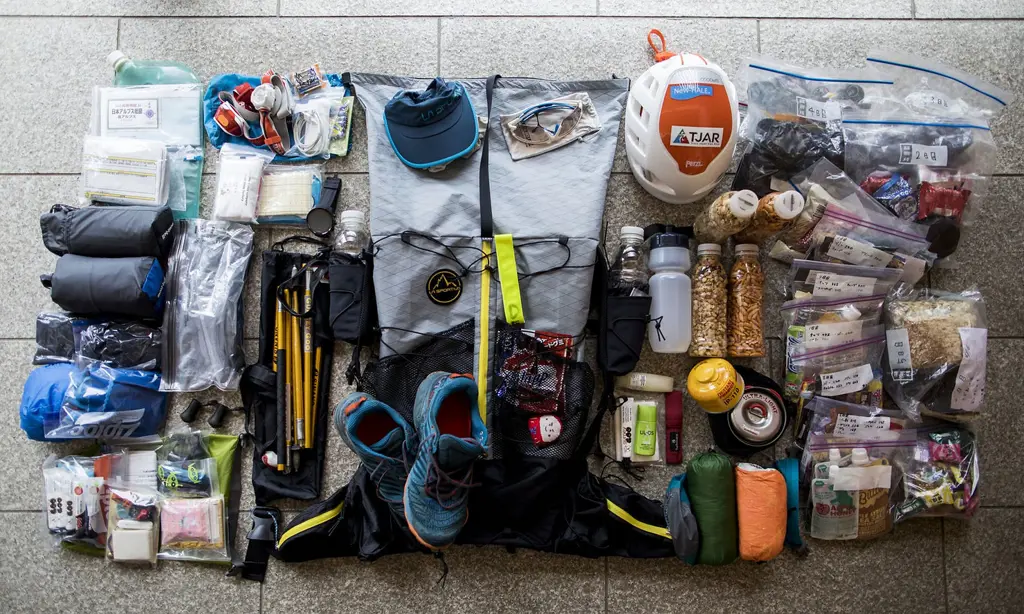
If you're planning to climb Mount Fuji, it's important to be prepared with the right safety items and emergency gear. Mount Fuji is a challenging and unpredictable mountain, and hikers need to be prepared for potential dangers and emergencies. Here are some essential safety items and emergency gear that should be included in your Mount Fuji packing list:
- Hiking boots: A pair of sturdy and waterproof hiking boots is essential for climbing Mount Fuji. The terrain can be rough and slippery, and having proper hiking boots will provide you with the necessary grip and support.
- Clothing layers: Mount Fuji's weather can change rapidly, and temperatures can drop significantly. It's important to dress in layers so that you can adjust your clothing according to the conditions. Include a base layer, mid-layer, and a waterproof and windproof outer layer.
- Headlamp: Mount Fuji is best climbed during the night to reach the summit for sunrise. A reliable headlamp is crucial for navigating the dark trails and ensuring your safety. Make sure to bring spare batteries as well.
- Map and compass: While most trails on Mount Fuji are well-marked, it's always a good idea to have a map and compass as a backup. These tools can help you navigate in case you get lost or encounter poor visibility.
- First aid kit: A well-equipped first aid kit is essential for any outdoor adventure. Include items such as bandages, antiseptic wipes, painkillers, and blister treatment. It's also a good idea to carry any prescription medications that you may require.
- Emergency shelter: Mount Fuji's weather can be unpredictable, and you may need to shelter from rain or strong winds. A lightweight and compact emergency shelter, such as a bivvy bag or a small tent, can provide protection and keep you warm in case of an emergency.
- Personal locator beacon or satellite messenger: Mount Fuji is a remote and isolated mountain, and communication can be challenging. Having a personal locator beacon or a satellite messenger can be a lifesaver in case of an emergency, as it allows you to send your location and call for help.
- Plenty of water and food: Hydration and proper nutrition are crucial for a successful climb. Carry enough water to keep yourself hydrated throughout the hike, as water sources on the mountain may not be reliable. Pack high-energy snacks, such as nuts, energy bars, and dried fruits, to keep your energy levels up.
- Sun protection: Mount Fuji's altitude makes it more susceptible to sunburn and sun damage. Don't forget to pack sunscreen with a high SPF, a wide-brimmed hat, sunglasses, and lip balm with SPF protection.
- Emergency whistle: A lightweight emergency whistle can be a helpful tool for attracting attention in case of an emergency or getting lost. Whistles are much louder and can carry over longer distances than shouting.
Remember, safety should always be a priority when climbing Mount Fuji. It's important to be prepared and have the necessary safety items and emergency gear. It's also recommended to check the weather forecast and trail conditions before your climb and to inform someone about your hiking plans. With the right preparation and gear, you can have a safe and enjoyable climb up Mount Fuji.
Essential Items to Pack for Your Flight to Korea
You may want to see also
Frequently asked questions
When preparing for a climb up Mt. Fuji, it's important to pack appropriate clothing and gear. Make sure to bring warm layers, such as long-sleeve shirts, a light jacket, and a warm hat, as the temperature can drop significantly at higher elevations. Additionally, pack comfortable and sturdy hiking shoes to navigate the rocky terrain. Don't forget essentials like sunscreen, a headlamp for night climbs, a backpack with plenty of water and snacks, and a good camera to capture the stunning views.
If you plan on staying overnight on Mt. Fuji, it's important to bring a few specific items. A warm sleeping bag or blanket is crucial, as the temperatures can get quite chilly, even during the summer. A camping mat or lightweight inflatable pad can also provide added comfort while sleeping on the rocky ground. Additionally, bring some basic toiletries, such as toothbrush and toothpaste, hand sanitizer, and toilet paper, as the facilities on the mountain can be limited. Snacks, energy bars, and instant noodles are also recommended for nourishment during the overnight stay.
Yes, it is possible to rent or buy essential gear for climbing Mt. Fuji. Many shops and rental services near the base of the mountain offer equipment such as hiking poles, headlamps, warm clothing, and even climbing boots. However, it's important to check availability and make arrangements in advance, as these items can be in high demand during the climbing season. It's also important to note that rental gear may not always be in the best condition, so it's a good idea to bring your own if possible.



